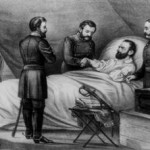posted by Writer on Oct 29
 As Hurricane Sandy pounds the eastern seaboard, this seems like an appropriate time to briefly explore the meaning behind the fourth reference to God in our Declaration. It reads, “And for the support of this Declaration, with a firm reliance on the protection of Divine Providence, we mutually pledge to each other our Lives, our Fortunes, and our sacred Honor.“
As Hurricane Sandy pounds the eastern seaboard, this seems like an appropriate time to briefly explore the meaning behind the fourth reference to God in our Declaration. It reads, “And for the support of this Declaration, with a firm reliance on the protection of Divine Providence, we mutually pledge to each other our Lives, our Fortunes, and our sacred Honor.“
One writer believes God is trying to get our attention with Sandy, asking if we’re going to trust Him or government. (1) Another made it a point to say that she is headed for Maine and Maryland, two Blue states, that have either legalized or allowed protections for same-sex marriages. (2)
Founder George Mason believed slavery was a sin and if the nation didn’t to something to about it, God would. Many years before the War between the States took place he said this, “As nations cannot be rewarded or punished in the next world they must be in this. By an inevitable chain of causes and effects Providence punishes national sins, by national calamities”. (3)
The Founders believed that “a nation…does not have an afterlife in which to answer for its actions, {and} the only time it can be recompensed for its actions, whether good or bad, is at the present.” (4)
That was one way our Founders looked at Divine Providence.
Another, as Franklin put it at the Constitutional Convention, was the way “God governs in the affairs of men.” Webster defined Providence as “the care and superintendence which God exercises over his creatures…Divine Providence is often understood as God Himself”. (5)
There are many recorded instances of God intervening on behalf of America during critical times, but one significant event occurred on May 2,1863 during the Civil War. Prior to that day the Confederate Army, under the command of General Thomas “Stonewall” Jackson*, had defeated the North in numerous battles.
President Lincoln called for a Day of Humiliation, Fasting and Prayer on April 30, 1863. Two days later, as Jackson was returning to his camp he was accidently shot by one of his sentires and died on May 10. Momentum swept to the North and shortly thereafter they defeated the South at Gettysburg.
Divine Providence was active in two arenas during the Civil War. Many believe God judged the nation for the sin of slavery, and when its stench was removed (under Lincoln’s leadership and the confession of sin by the people), God preserved the United States with the victory at Gettysburg. However, this came at tremendous cost, because the Civil War was the bloodiest in our history.
There is abundant evidence in Scripture where God providentially intervened in the lives of Joseph, Moses, David, Esther and Daniel to name a few. Actually, the entire Bible is one continuous story revealing that God is in control of everything (Romans 8:28).
It is comforting to know that He is also intimately concerned with our lives as well (Psalm 139:17-18).
*****
(1) Rosenberg, Joel, ‘God’s October Surprise’, Flashtraffic 10-29-12; (2) Wilson, Bill, The Big Storm – politically, prophetically, spiritually, The Daily Jot 10-29-12; (3) Barton, David, The Myth of Separation, p. 217; (4) Barton, David, The Myth of Separation, p. 217 (5) Webster, Noah, An American Dictionary of the English Language, p. 883
* = General Jackson was a very strong Christian and one the greatest soldiers in our history. I encourage you to read more about him and how he came to earn the nickname “Stonewall.”
October 30th, 2012 at 12:10 pm
To your foot note: For those who aren’t as likely to pick up a book, I would recommend the film Gods and Generals from 2003, a prequel to Gettysburg made ten years earlier. It was a limited but amazing portrayal of this Christian war hero as he successfully leads the Confederacy in battles against the Union from 1861 to 1863.
The film was not well received by critics, in fact it was ridiculed by most. It wasn’t seen as following the original book, was still too long, and many did not like its “Southern sympathies.” It may also have been in part due to its overt representation of Jackson’s strong Christian faith, which was surprising being fully financed ($65 million) by non-believer Ted Turner. As with his earlier films taken from the Bible (Abraham, Jacob, Joseph, Moses, etc.), Turner strove to be true to character and text.
Despite its negative reviews this film helped me to understand much about the Civil War that had alluded me, especially as it presented the South’s perspective and patriotism of which I was fairly ignorant.
The Constitutional aspects of the South’s position were particularly eye-opening. They saw the war as a “Second War of Independence” for the Southern States, as Constitutional State’s Rights were violated by the Federal Government to preserve the Union! It was probably this film that inspired me to actually study our amazing founding documents.
It’s a long film, over three hours, but as a Christian I found the history and characterizations rich and riviting and worth every moment for what I gleaned from it. (I hope to watch the five hour director’s cut sometime!)